Handshake
(hns)
AvailableAlgorithm:
Block Time:
Block Reward:
Block Reward24:
Last Block:
Difficulty:
Difficulty24:
Network Hashrate:
Exchange Rate:
Exchange Rate24:
Exhcange Rate Vol:
Market Cap:
Estimated Rewards:
Estimated Rewards24:
BTC Revenue:
BTC Revenue24:
Profitability:
Profitability24:
Handshake
593.00
1,000.00
1,000.00
252,172
646,720,067.97M
657,327,916.89M
4.68 PH/s
0.01 USD
0.01 USD
6,485.69 USD
$6,803,273
274.912252
-
0.00002998
-
-
-
Market Data For handshake
| Current Price | $0.36 |
| Market Cap | - |
| Market Cap Rank | - |
| Total Volume | - |
| High 24H | - |
| Low 24H | - |
| Price Change 24H | - |
| Price Change Percentage 24H | - |
| Market Cap Change 24H | - |
| Market Cap Change Percentage 24H | - |
| Circulating Supply | - |
| Total Supply | - |
| All Time High | - |
| All Time Low | - |
Mining Pools For handshake
| Pool | Location | Fee | Rating |
|---|---|---|---|
| ViaBTC Professional Mining Pool | Reviews & Features | ASIA, EUROPE, AMERICA | PPS+ 4% PPLNS 2% | 3 |
| F2POOL Mining Pool | Reviews & Features | ASIA,USA,AMERICA | 4% PPS | 2 |
Mining Equipments For handshake
| Name | Model | Hashrate | Rating | Lifespan |
|---|---|---|---|---|
| Goldshell HS1 Plus Review and Profitability Calculation Estimate | 440 | 105 GH/s | 3 |
Coin Data For handshake
Calculator For handshake

Crypto currency to Fiat Currency Converter
About handshake
Handshake Coin Review: Mining Guide, Price & Analysis of Handshake Cryptocurrency
Handshake is a system that offers a decentralized solution to domain naming protocols. As it stands, centralized actors have total control of the names on the Internet. The platform provides a peer-to-peer system managed by remote network participants. The goal is to remove the need for centralized institutions.
Moreover, it delivers a more secure and resilient solution. Decentralization rids the Internet of issues such as corruption and censorship. The Internet has a layered arrangement. To decentralize it, the platform starts at the lowest layers of the stack. The architecture ensures you are always communicating with the right endpoint.
Furthermore, a decentralized Internet was the original vision when it started. However, decentralized systems stopped working due to spam. Additionally, these systems could not manage griefing and Sybil attacks. Therefore, there was a need for centralized institutions to address such problems. It offers a practical solution to this. It makes it computationally expensive to attack the network. As a result, the probability of attacks drastically reduces. Let’s see how the platform works.
How Handshake Works
Handshake uses Proof-of-Work to allow for decentralization. This design enables people to resolve names rapidly. This design is actually quicker than querying Google’s DNS resolvers. It is faster because your SPV node has the data locally cached. Moreover, it allows users to run their own local recursive DNS resolvers. The existing DNS does not let users do this. This is because it needs a central authoritative proxy.
Further, Handshake blockchain does more to keep the history of domain name ownership. It utilizes an auction system through smart contracts called covenants. The system is in-protocol and on-chain. These smart contracts allow for consensus-level behaviour. This is the same ideology that gave rise to Ethereum. The auction system the platform uses is ground-breaking. To bid, you send Handshake coins (HNS) into a covenant. The covenant then locks it up until the auction is over. These bids are blind bids.
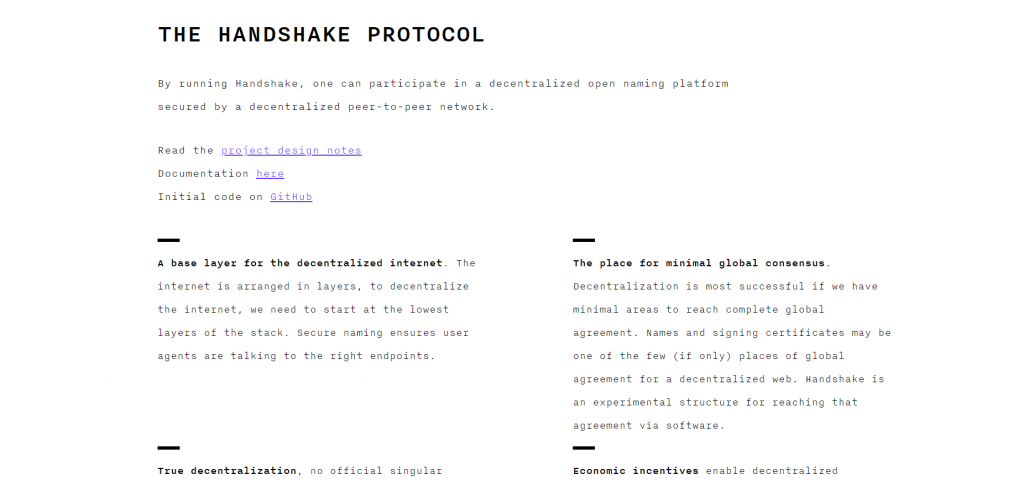
For example, you can lock up 10 HNS into the covenant. Then, you place a bid of 5 HNS. The system uses hashing protocols on your original bid and provides you with that hash. The auction then goes through a weeklong reveal period. After this, you reveal your actual bid and withdraw 5 HNS from the covenant as change. The rest of the 5 HNS remains locked for two weeks. By this time, the auction is over, and the winner is chosen. The losers get their HNS coins back. The winner pays the second-highest bid, and the covenant burns their coins.
Can Investors Mine Handshake Coins?
Yes, investors can mine HNS coins. Mining on the Handshake blockchain started in February 2020. Each miner competes to solve a cryptographic equation to form the next block’s header. The greater the computational power, the better the chances of successfully mining a block. The platforms Proof-of-Work uses Blake2B and SHA3 algorithms. Further, Handshake allows for both solo and pool mining. However, it makes no sense to mine alone. Solo mining is no longer profitable on most blockchains.
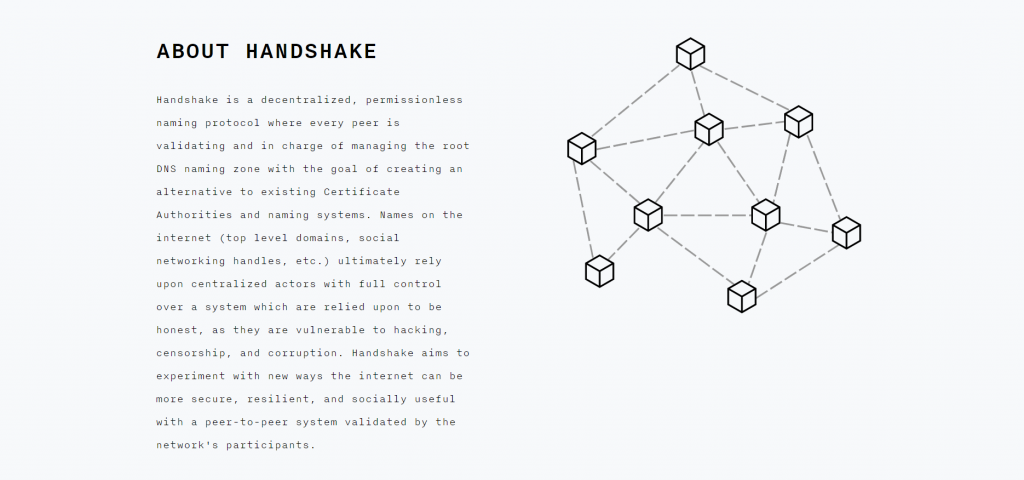
Hence, the best way to mine Handshake coins is pool mining. There are currently four mining pools supporting Handshake mining. These include F2pool, HNSPool, 6Block and PoolFlare. Miners have to choose a mining pool that best suits their needs. Then all you have to do is register for the mining pool.
The Team behind Handshake
Handshake has a formidable team behind it. The leader of the team is Joseph Poon. He is a co-creator of Bitcoin’s Lightning Network and Plasma Payment channels. Further, the team includes Andrew Lee, Christopher Jeffery and Boyma Fahnbulleh.
All these team members have vast experience in blockchain technology and business. For example, Andrew Lee is the CEO of Bitcoin payments gateway Purse. Christopher Jeffery is the CTO of Purse and creator of Bitcoin node software Bcoin. Further, Boyma Fahnbulleh is a Bcoin developer. Hence, it is safe to say that Handshake is in safe hands. These individuals have the experience necessary to spearhead this project into the future.
Privacy and Security
Handshake has a lot of security features that make it formidable. Handshake keeps out Sybil attacks by making it extremely expensive to carry out the attacks. The decentralized nodes work together to maintain the security of the network. Moreover, Miners help record transactions onto the ledger. These records become immutable once recorded. Additionally, Handshake adjusts the difficulty level from time to time. The network borrows from Zcash’s targeting difficulty. This makes it very expensive for attackers to operate.
Handshake uses hashing algorithms to keep bids private. User bids remain private until the reveal period is over. This shows that Handshake is very committed to the privacy of users. Moreover, it shows that Handshake can apply hashes to any detail to conceal it from the public. There is a lot this company can do to maintain privacy.
Governance
The Handshake project uses a community-based governance system. Holders of the coin can submit an updated proposal for the community to consider. The community debates and votes on the new proposal. If adopted, node operators need convincing to update to the new system.
The success of the new changes depends on the adoption rate. There needs to be a high adoption rate for the changes to be successful.
Further, there is no on-chain governance.
Our Take on Handshake
The approach that Handshake provides is very compelling. The original Internet was a decentralized entity. However, many institutions now control vital aspects of the Internet. Handshake offers a practical solution to this. The result is faster and more secure Internet. With enough public adoption, Handshake is set to thrive. We will have an existing alternative to certificate authorities and naming systems. This means we rid the Internet of corruption, censorship and most vulnerabilities.
This gives us a more socially usable Internet. This has excellent economic incentives. Without central organizations, there is more freedom. Participants have the right to add entities or serve as hosts and validators. There will be no restrictions. As a result, Handshake coins have the potential to see significant adoption. More people are using Namesake than people think. From that, a few cool handshake-only mini-sites are starting to pop up.
Advantages
- The Platform offers a base layer for a decentralized Internet.
- It is an alternative to certificate authorities.
- It is fast and secure.
Disadvantages
- Not massively adopted yet.
How to Buy Handshake Coins
Handshake coins are a great asset to add to your portfolio. As the Internet heads into a decentralized future, so will the value of HNS coins rise. Luckily, several exchanges support the trade of Handshake coins. These include Poloniex, Hotbit, Namebase, WhaleEx and Bittrex.
The price of one HNS coin is $0.103. However, buyers can purchase Handshake coins using other cryptocurrencies. Most of the exchanges support other cryptocurrencies. The market cap for HNS is $35,118,648. This places it at rank 186 in market cap share. Further, the circulating supply of HNS is 338,629,598.
Final Verdict
Handshake offers a compelling value proposition. It provides a practical alternative to centralized certificate authorities. The freedom that comes with this has vast economic incentives. Moreover, this solution is faster and more secure. We believe this project will see more adoption from the community. The developers should ensure people see Handshake for what it is. Then, they will onboard. This is the only way that Handshake coins will gain more value.
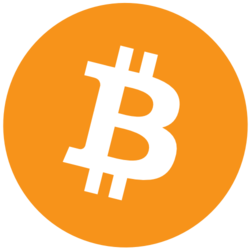 $97,172.00
$97,172.00
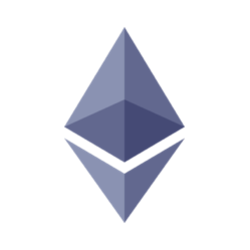 $3,109.04
$3,109.04
 $1,528.07
$1,528.07
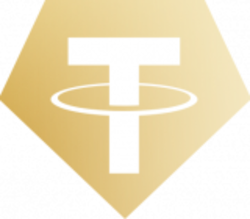 $2,389.10
$2,389.10
 $609.61
$609.61
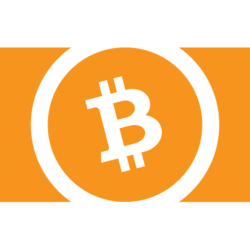 $516.49
$516.49
 $294.43
$294.43
 $161.98
$161.98
 $88.85
$88.85
 $157.97
$157.97
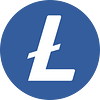 $86.66
$86.66
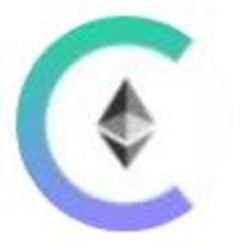 $74.47
$74.47
 $76.21
$76.21
